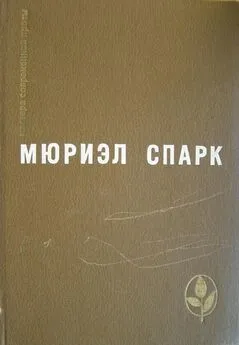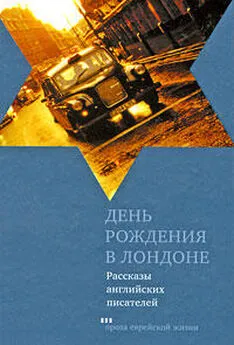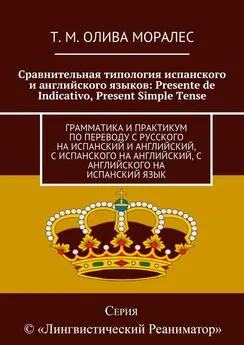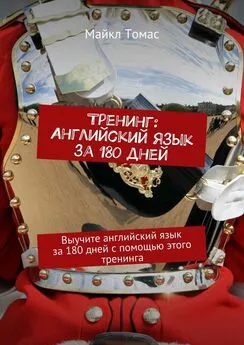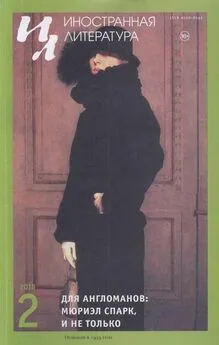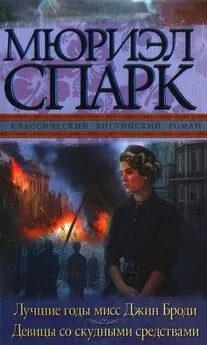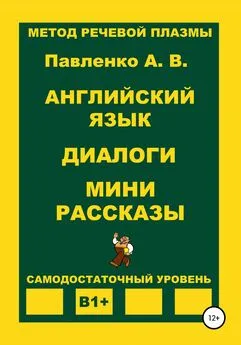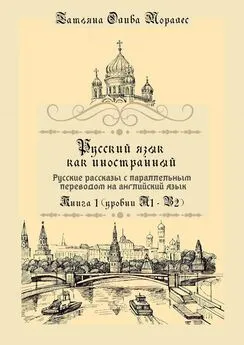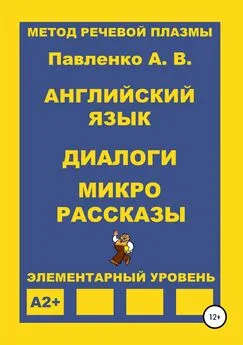Мюриэль Спарк - Английский язык с Мюриэль Спарк (рассказы)
- Название:Английский язык с Мюриэль Спарк (рассказы)
- Автор:
- Жанр:
- Издательство:неизвестно
- Год:неизвестен
- ISBN:нет данных
- Рейтинг:
- Избранное:Добавить в избранное
-
Отзывы:
-
Ваша оценка:
Мюриэль Спарк - Английский язык с Мюриэль Спарк (рассказы) краткое содержание
Английский язык с Мюриэль Спарк (рассказы) - читать онлайн бесплатно полную версию (весь текст целиком)
Интервал:
Закладка:
"Maybe I'll marry Skinny when he's well again."
"Make it definite, Needle, and not so much of themaybe. You don't know when you're well off," shesaid.
This was five years ago (это было пять лет назад), in the last year of my life (в последний год моей жизни). Kathleen and I had become very close friends (Кэтлин и я стали очень близкими подругами; close — близкий ). We met several times each week (мы встречались несколько раз в «каждую» неделю), and after our Saturday-morning excursions (и после наших субботних утренних прогулок) in the Portobello Road (по Портобелло Роуд) very often (очень часто) I would accompany Kathleen (я сопровождала Кэтлин) to her aunt's house (в дом ее тети; aunt — тетя ) in Kent (в Кенте; Kent — графство в Англии ) for a long week-end (на долгие уик-энды; long — длинный ).
One day in the June (одним июньским днем) of that year (того года) I met Kathleen specially for lunch (я встретилась с Кэтлин специально за ланчем) because she had phoned me (потому что она позвонила мне; to phone — звонить по телефону ) to say she had news (чтобы сказать, что у нее есть новости).
accompany [q'kAmp(q)nI] lunch [lAnC] phone [fqVn]
This was five years ago, in the last year of my life.Kathleen and I had become very close friends. Wemet several times each week, and after our Saturday-morning excursions in the Portobello Road very often I would accompany Kathleen to her aunt'shouse in Kent for a long week-end.
One day in the June of that year I met Kathleenspecially for lunch because she had phoned me to sayshe had news.
"Guess (угадай) who came into the shop this afternoon (кто пришел ко мне в магазин сегодня днем)," she said.
"Who (кто)?"
"George."
We had half imagined (мы уже «наполовину» вообразили, что; to imagine — представлять, воображать ) George was dead (Джордж умер; dead — мертвый ). We had received no letters (мы не получили ни одного письма: «получили никаких писем»; to receive — получать; letter — письмо, буква ) in the past ten years (за последние десять лет; past — прошедший ). Early in the war (в начале войны: «рано войной»; early — рано ) we had heard rumours (до нас дошли слухи: «мы слышали») of his keeping a nightclub in Durban (что он содержал ночной клуб в Дурбане; to keep — содержать, держать; night (ночь) + club (клуб) ), but nothing after that (но ничего после этого). We could have made inquiries (мы могли бы выяснить: «сделать запросы»; inquiry — запрос, наведение справок ) if we had felt moved to do so (если бы мы чувствовали желание сделать это: «чувствовали себя тронутыми»; to feel — чувствовать; to move — двигать/ся/, передвигать/ся/ ).
guess [ges] imagine [I'mxGIn] rumour ['ru: mq]
"Guess who came into the shop this afternoon,"she said.
"Who?"
"George."
We had half imagined George was dead. We hadreceived no letters in the past ten years. Early in the war we had heard rumours of his keeping a nightclubin Durban, but nothing after that. We could havemade inquiries if we had felt moved to do so.
At one time (однажды), when we discussed him (когда мы обсуждали его), Kathleen had said (Кэтлин сказала),
"I ought to get in touch (я должна связаться; to get in touch; touch — прикосновение ) with poor George (с бедным Джорджем). But then I think (но затем я думаю, что) he would write back (что он ответит: «напишет назад»). He would demand (он потребует) a regular correspondence again (вести с ним постоянную переписку)."
"We four must stick together (мы четверо должны держаться вместе)," I mimicked (я изобразила (Джорджа); to mimic — пародировать передразнивать ).
"I can visualize (могу представить себе) his reproachful (его упрекающие ; to reproach — упрекать ) limpid orbs (ясные глаза; limpid — прозрачный; orb — шар )," Kathleen said.
Skinny said, "He's probably gone native (возможно, он заделался туземцем; to go native — перенять обычаи туземцев ). With his coffee concubine (с его шоколадной: «кофейной» любовницей) and a dozen mahogany kids (и десятком краснокожих детишек: «из красного дерева»; dozen — дюжина; kid — ребенок )."
"Perhaps he's dead (возможно, он умер)," Kathleen said.
ought [O: t] reproachful [rI'prqVCf(q)l] concubine ['kONkjVbaIn]
"At one time, when we discussed him. Kathleen had said,
I ought to get in touch with poor George. Butthen I think he would write back. He would demand a regular correspondence again."
"We four must stick together," I mimicked.
"I can visualize his reproachful limpid orbs,"Kathleen said.
Skinny said, "He's probably gone native. With hiscoffee concubine and a dozen mahogany kids."
"Perhaps he's dead," Kathleen said.
I did not speak of George's marriage (я не сказала ни о женитьбе Джорджа), nor of any of his confidences (ни об одном из его признаний; to confide in smb — довериться кому-либо ) in the hotel at Bulawayo (в гостинице в Булавайо). As the years passed (когда годы прошли) we ceased (мы перестали) to mention him (упоминать его) except in passing (иногда только вскользь: «за исключением»; passing — проходящий, случайный ), as someone more or less dead (как кого-то более или менее умершего) so far as we were concerned (по крайней мере, для нас; to be concerned — беспокоиться, быть связанным с чем-либо ).
Kathleen was excited about (Кэтлин была взволнована; to be excited about smth — радоваться; excited — взволнованный, возбужденный ) George's turning up (внезапным появлением Джорджа; to turn up — подниматься вверх ). She had forgotten (она забыла) her impatience with him (свое раздражение им: «нетерпение с ним»; (im)patience — (не)терпение ) in former days (в былые времена: «в бывшие дни»); she said (она сказала),
"It was so wonderful (было так замечательно; wonderful — удивительный ) to see old George (увидеть старину: «старого» Джорджа). He seems to need a friend (ему, кажется, нужен друг), feels neglected (/он/ чувствует себя покинутым; to neglect — пренебрегать, не заботиться ), out of touch with things (совсем потерял связь с миром: «не касается вещей»)."
cease [si: s] impatience [Im'peIS(q)ns] former ['fO: mq]
I did not speak of George's marriage, nor of anyof his confidences in the hotel at Bulawayo. As the years passed we ceased to mention him except inpassing, as someone more or less dead so far as we were concerned.
Kathleen was excited about George's turning up. She had forgotten her impatience with him in former days; she said,
"It was so wonderful to see old George. He seems to need a friend, feels neglected, out of touch withthings."
"He needs mothering (ему нужна материнская забота). I suppose (я полагаю).''
Kathleen didn't notice the malice (Кэтлин не заметила ехидства; malice — злорадство, злоба ). She declared (она объявила; to declare — провозглашать ), "That's exactly the case with George (в этом все и дело, с Джорджем: «это точный случай с Джорджем»). It always has been (и всегда в этом было дело), I can see it now (я понимаю: «вижу» это сейчас)."
She seemed ready (казалось, она готова; ready — готовый ) to come to any rapid and happy conclusion about George (прийти к любому быстрому и счастливому умозаключению: «выводу» о Джордже; rapid — скорый, happy — счастливый; conclusion — завершение, вывод ). In the course of the morning (в течение утра) he had told her (он рассказал ей) of his wartime nightclub in Durban (о своем ночном клубе в Дурбане во время войны; war (война) + time (время) ), his game-shooting expeditions since (о своих экспедициях с охотой на дичь; to shoot game — стрелять дичь ). It was clear (было ясно, что) he had not mentioned Matilda (он не упомянул Матильду). He had put on weight (он потолстел: «набрал вес»), Kathleen told me (сказала мне Кэтлин), but he could carry it (но он хорошо держался: «мог нести его /вес/»).
mothering ['mADqrIN] malice ['mxlIs] conclusion [kqn'klu: Z(q)n] weight [weIt]
"He needs mothering. I suppose.''
Kathleen didn't notice the malice. She declared, "That's exactly the case with George. It always has been, I can see it now."
She seemed ready to come to any rapid and happyconclusion about George. In the course of the morning he had told her of his wartime nightclub inDurban, his game-shooting expeditions since. It was clear he had not mentioned Matilda. He had put on weight; Kathleen told me, but he could carry it.
I was curious (мне было любопытно; curious — любопытный ) to see this version of George (увидеть такого Джорджа: «эту версию»), but I was leaving for Scotland (но я уезжала в Шотландию; to leave for ) next day (на следующий день) and did not see him till September (и не видела его до сентября) of that year (того года) just before my death (незадолго: «прямо перед» до моей смерти).
Читать дальшеИнтервал:
Закладка:

